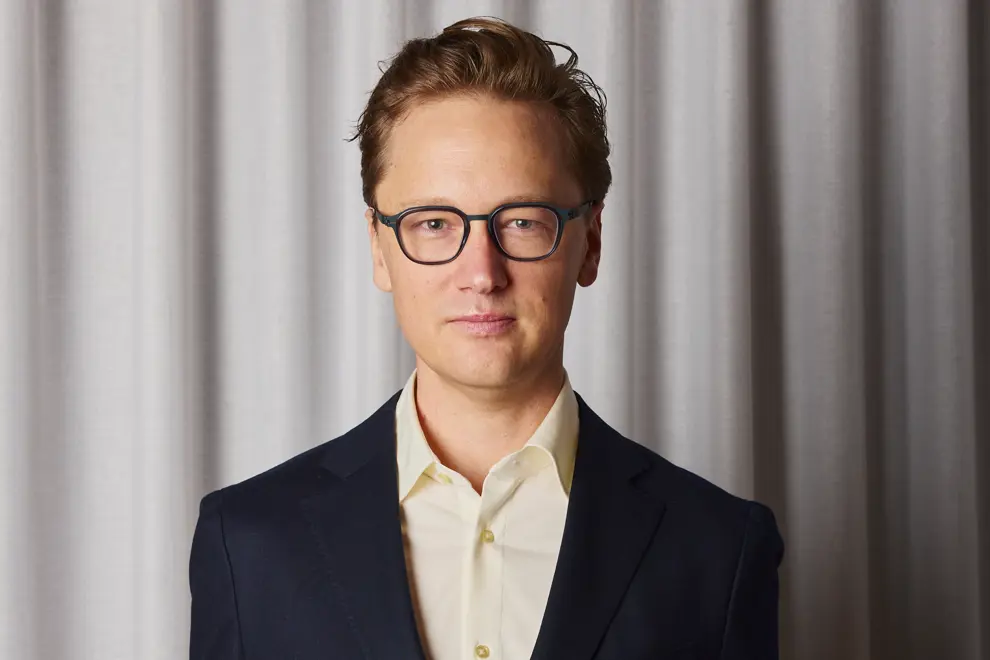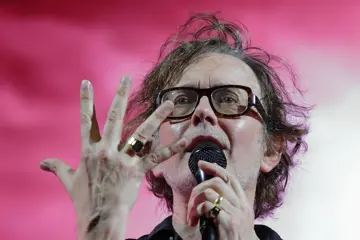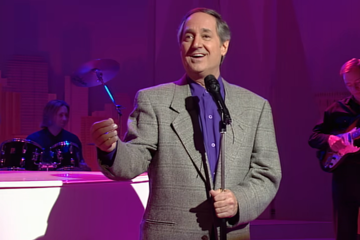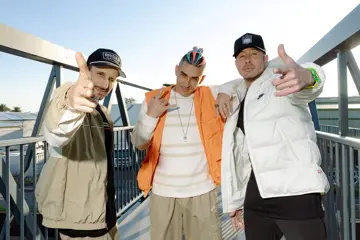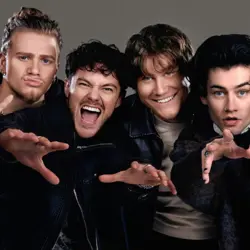 Midnight Til Morning
Midnight Til MorningAustralia isn’t exactly synonymous with the boy band genre, but in recent years, the rise of K-pop has given local audiences a taste of a new generation of pop acts. To date, we’ve yet to see a 90s-style Australian wave, the likes of Human Nature, CDB, and Kulcha, taking up the mantle in the 21st century, but is the dam about to break?
Enter Chugg Music’s Andrew Stone, who is rolling the dice on Midnight Til Morning, one of Australia’s strongest export successes in 2025, after forming on the hit Netflix series Building The Band. With A-list judges and a big global budget, the series was a springboard for a young Mason Watts, who was signed to Chugg Music after being discovered by Stone in 2020 as COVID struck. Stone was approached during that period by a producer from Netflix who was interested in looking at artists who could fit the TV reality show brief.
“He [Watts] was on a bit of a roll again with his solo career, but then he got locked in Melbourne for six or seven months, which was hard for a kid from Toowoomba. He was eventually convinced to give it [Building The Band] a go. He was very gracious, and the casting people loved him. They flew him out to LA, and it was all very secret. They had to wear these big ski masks and gowns and walk between the halls without the press or each other seeing them.”
Stone said the show was unlike the stereotypical one, with the rights continuing to sit with the artists after the show, allowing the ability for the artists to make their own choices after the cameras stopped rolling.
Don't miss a beat with our FREE daily newsletter
“They weren't trying to make an enduring boy band success and capitalise on it financially. They wanted the bands to be successful, but I actually think that by allowing their teams to then take the opportunity and run with it, it actually opened up the visibility of the artists more than it would have. They're experts at making TV shows, and they're very good at it, and we're experts at making hit artists and doing the development part of it, the touring part of it and everything that has to follow for the next few years”
Watts connected with three other young singers (including fellow Aussie Conor Smith) to form Midnight Til Morning, and following the filming of the show, Stone and his business partner Michael Chugg flew the band out to Australia to present their vision to them. The show’s release was delayed after the tragic death of judge and ex-One Direction member Liam Payne, giving the team time to put together a plan for what was to come next. The band ultimately signed with Chugg Music for management and label, giving them access to the team and funding required to build to the next level.
“They want to make a career out of it, and Mason was able to communicate that the work starts now,”. Stone remarks. “We didn't know at the time when the show was going to air. We didn't know what was going to come of it, how big it was going to be, how much profile it was going to have. We just didn't have that information because Netflix traditionally is a very tight operation and a closed book. But we said whatever we do, we need to start now.”
The band flew to Sydney in September 2024, ten months before the show aired, staying in Australia for a month to record music and discuss what the future with Chugg Music could look like.
“We discussed how they wanted to present themselves. Did they want to write their own music? What did they envision their touring setup to be like? All of those different factors. We started working on some music straight away, including their first single, which was a pitch song from Benson Boone, Amy Allen and Scott Harris. They recorded that with some cool teams here in Sydney, and I think that they really felt that it was something special and that provided us a confident platform to pitch a longer-term involvement with the band.”
With the deal inked, Chugg Music got to work plotting a plan for success, revolving around live performance, fan engagement and first-party data capture to capitalise on the launch of the TV show. Stone tapped into global touring powerhouse AEG and convinced them to take on the band sight unseen, impressing them with the music and strategy.
“Ultimately, we were ready ahead of the show launch to capture the fan data required to then sell those tickets, then put the shows on sale to develop this close-knit communication that the band has with their fans via TikTok, Instagram, Discord, group chats and fan sites, then give the new fan base something to really get behind. I think it’s the emotional resonance and deep connection that the fandom has with the band that is the fuel to this fire.”
While it’s just four months after the release of the TV show, the plan is showing amazing results, with 50,000 tickets sold around the world on their first tour, over $1 million in merch sales and approaching 30 million streams of the band’s debut EP.
“From a marketing point of view, I think that the best practice is coming out of Korea. We looked at BTS and Blackpink and a lot of those fandoms, groups and agencies and used that as a model for how we built out the communication strategies with our audience.
“Our strategy revolved around providing the fans with a schedule of what's coming up so they've got something to look forward to. That was a little bit different to our traditional way of thinking, which is that we announce a video clip's coming and then we release a video clip. Instead, fans like to know that it's going to come in four weeks' time and then a week before that we're going to get a teaser and then we're going to get a behind-the-scenes that happens a week after it.”
Stone said they delved deep into the psychology of fandom, liaising with fans of One Direction and 5 Seconds of Summer to examine how and why they formed the connections they did. They discovered that while there was a path to lead fans to, it was about having the best possible product and then delivering on the promises made to the fan.
“A prospective fan says, ‘I'm going to get on board now because I can see where this is going’. And if I buy a ticket, I've got something to look forward to, and I've got all this music to consume in the meantime. And I've got this group of other fans of Midnight Til Morning all around the world who I can talk to and engage and rev each other up about how great the band is.
“That’s what they want, and then it's on us to deliver ultimately. And if we can, then provide the fans with this hour and a quarter show of 17 songs, and it's the best experience of their lives, then they're going to come back. They're going to tell everybody. They're going to ensure the band has a strong economic base for years to come. And that’s what allows us to be able to give the band a proper career and a return on our investment from a label point of view.”
Stone said that the ‘ah ha!’ moment came when talking to a member of the One Direction fan club who explained why she spent so much time dedicated to the band.
“She told me, ‘They've given us so much, so we want to give back to them,’ and I think it's in part this relationship that the fandom has with an artist is that they want the artist to succeed. They're going to spread the word about them because they want the artist to keep delivering great product, great moments, and culturally important moments for them. It flipped the way that I thought about quite a lot. It means that we have to live up to the fans’ expectations [if we want them to be our advocates].”
Stone said that there was a conscious effort with Midnight Til Morning to be playing at an international level from the start, which meant investment and “dropping the excuses.”
“When you’re playing at that international level, you have to perform because the judgment is going to be that much harsher. Quite frankly, people expect hit songs, and they expect great shows. They're used to seeing Taylor Swift shows. They're used to seeing a sombr show. We have to compete with that because they have every other entertainment option presented to them these days.”
The success of the band, ultimately, according to Stone, will come down to work ethic, and that goes for both the band and their team. The health and well-being of the artists are a big part of that, and ultimately, the drive for success and professionalism of the artists is the ingredient Chugg Music is betting on.
“So, it's clear to us that they [Midnight Til Morning] have the work ethic. It's clear to us they've got the talent. And I think it's incumbent on us to provide some context to the opportunity that they are now presented with when it comes to the discipline, the schedule, the amount of work that has to go in to deliver, day in, day out. And to that end, they're very good in terms of staying healthy on the road. Not drinking and making sure that the various other vices that can come around a band, whether it's from parties or whatever, are just not a factor because they're just too busy to be honest.
“They've also said that this is their job. You know how hard an Olympic athlete works to get a gold medal? There are fewer gold records being handed out than gold medals at the moment. You have to work, train and perform at the level of an Olympic athlete if you're going to break through.”
Stone is no stranger to success, having steered the international careers of bands like Sheppard and Lime Cordiale, and he credits those bands for opening his eyes to what it takes to succeed. He explained that around ten years ago, both bands made a conscious decision to go from delivering a song a month to a song a day and concentrating on becoming prolific songwriters.
“When it came time for Lime Cordiale to deliver what I think was their real breakthrough album, 14 Steps To A Better You, they delivered us two hundred demos. We picked the fourteen best songs and they've all gone gold or platinum in different in different formats.
“I think that that output matched with creative excellence creates a compelling product for audiences who want to have that experience of not just knowing one or two songs at a festival but an entire set of songs that they love, that they've heard, that they've gotten to know over the years. And then it's that audience engagement that then fuels the algorithmic growth that follows because you've then got this deep fan base who are connected with the music that then, by their habits, by their consumption, are informing people who would like to discover a band that might be similar in their audience profile to what these super fans are.”
Chugg Music’s model of sharing in both management and label rights is controversial in some circles, but successful, building on the blueprint of Michael Gudinski’s Mushroom Records, where multiple rights streams could be leveraged within the one company group.
“Well, I think it happened by accident because there weren't labels that wanted to sign our artists. We shopped Sheppard around, we shopped Lime Cordiale around, we shopped all of our artists around to every label in the country, and they all said no.
“We ended up partnering [with labels] on a few projects over the years, which have been successful in part, but also they've come with their challenges, and along that journey, we've learned a lot about how to release records and how to make the right investments at the right time. Quite frankly, as managers, we've become frustrated with labels not understanding the investment opportunities that were there for audience growth that didn't neatly fit into the remit of what a label would spend money on.”
“For us, audience growth, market growth is just as incumbent on the artist to be touring across Europe, playing 200 capacity venues and taking a $30-40,000 loss on that tour as it is to be, say, spending ads on Google or taking out ads in publications. All of those things are important, don't get me wrong, but I think [in our model] you have the overall scope of what it is to go to market within your control, which I think is more crucial now than ever. Instead of having to give this speech every single time we want to sign off on a new photo shoot or something, Chuggi and I found it much easier to just spend the money ourselves.”
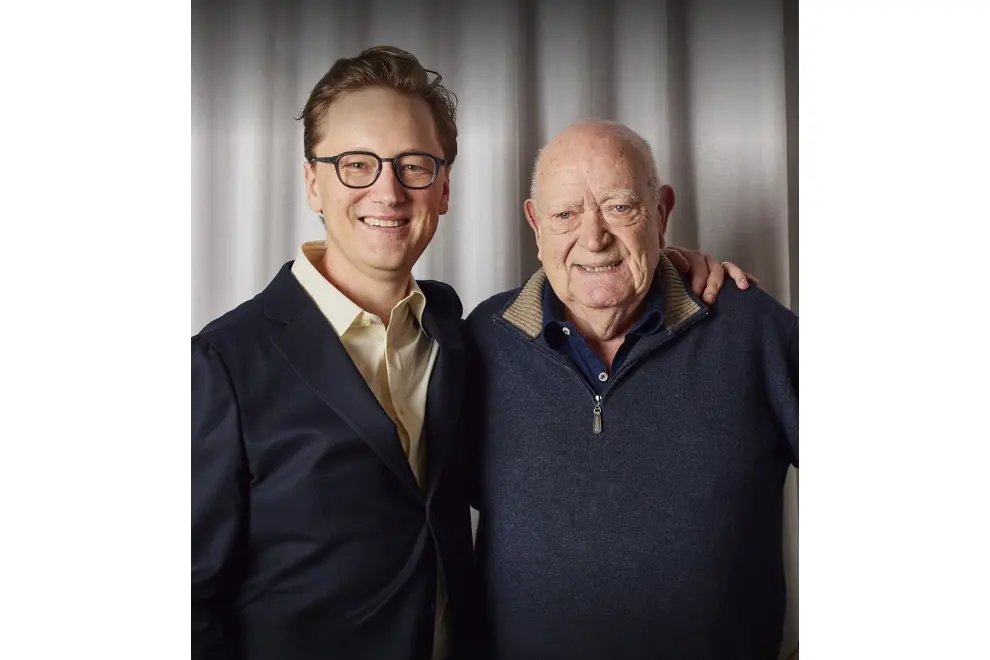
The relationship between Stone and Michael Chugg (Chuggi) is one built on trust, with the business about to enter its fourteenth year, in an industry where partnerships struggle to survive the often cutthroat nature of the game. Reflecting on why such enduring partnerships are rare, Stone explained that he brought an “ear to the ground” intelligence, while Chuggi’s decades in music were able to provide wisdom and relationships to the direction the business makes, which can only work by mutual respect.
“I think the hurdle [for most business relationships] is ego. Michael's not the kind of person who you'd think would lack one, but he doesn't have the type of ego that is in any way prohibitive to people's success around it. I think the same goes for me as the person on the other side receiving the opportunities [of working with him].
“You need to be able to shut up and listen and take it all in and not skip steps and really understand the opportunity and the privilege that we have to work in this business.”
As the business heads into 2026, Stone says they are as committed as ever, both to each other and to the artists they serve. We ask Stone where we’ll find him in twelve months’ time.
“At a concert, waving the flag, Chuggi next to me, yelling at the sky with success. I think we have an incredibly exciting 2026 coming up with all of our artists. We thought 2025 was going to be a quiet year, but then all of a sudden, we signed this boy band, and it has taken up a lot of our time and attention, so you never know what’s around the corner.”
“But next year we've got a Lime Cordiale album, we've got a Teenage Dads album, we've got an aleksiah album, we've got a Midnight Til Morning album probably, we've likely got a new Sheppard record coming. So, it's like all of our roster will be firing and I think that a lot of what we've learned, in particular on Midnight Til Morning and their fandom and our ability to take that group to market, we'll be able to apply those learnings across the roster and really see some breakthrough success in a new and compelling way.”

